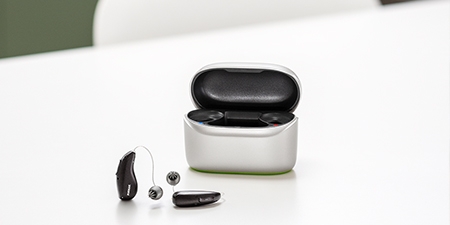Learn the Causes, Symptoms & Treatments for Ear Eczema

Learn the Causes, Symptoms & Treatments for Ear Eczema
10 min
Published October 24, 2024
Causes, Symptoms, and Treatments for Ear Eczema
Ear eczema affects many people worldwide, causing discomfort and impacting daily life. While the ears are a common area for an outbreak, it can happen anywhere on the body. Understanding this condition is the first step toward managing its symptoms and improving your overall health. For the best results, discuss any health concerns you have with your ear doctor or healthcare provider.
What is Eczema?
Eczema is a group of conditions that cause inflammation, itchiness, and redness of the skin. There are seven different types, but atopic dermatitis is the most prevalent, affecting more than 26 million children and adults nationwide, according to the National Eczema Association. In particular, ear eczema can be quite bothersome, given the sensitivity and visibility of the area and concerns related to hearing loss if conditions are uncontrolled. However, understanding its commonality can help normalize discussions around the condition and encourage those suffering to seek treatment.
Causes of Eczema
Although the exact cause of eczema isn’t fully understood, it's commonly believed to result from a combination of genetic and environmental factors. Research indicates a strong genetic component to eczema. If you have a family history of eczema, asthma, or allergies, you’re more likely to develop the condition. Additionally, evidence suggests a link between eczema and other immune system issues, such as asthma and hay fever, highlighting the interconnected nature of these health issues.
Common Triggers for Eczema Breakouts
Hearing aids don't cause ear eczema, but if you have it and wear a device, it could increase the symptoms. Several other factors will more likely trigger or worsen eczema symptoms, including:
Allergens - Dust mites, pet dander, pollen, and certain foods.
Irritants - Soaps, detergents, shampoos, and disinfectants.
Environmental Factors - Cold, dry weather, or hot, humid climates.
Stress - Emotional stress can exacerbate symptoms.
Sweat and Heat - Excessive sweating and overheating.
Infections - Skin infections can trigger flare-ups.
Symptoms of Ear Eczema
Recognizing the symptoms of ear eczema is crucial for early intervention and treatment, and that goes for any other parts of your skin where you have an outbreak. Common symptoms include:
Itchiness and redness around the ear canal and outer ear
Dry, flaky, or scaly skin
Swelling and tenderness
Clear fluid discharge from the ear
Crusting or oozing patches on the skin
Eczema vs. Psoriasis: Similarities and Differences
While eczema and psoriasis share some similarities, including inflammation and redness, they are distinct conditions. Both cause red, inflamed, and itchy skin and can appear in the same areas, including the ears, but there are a few key differences:
Appearance and Symptoms - Eczema typically presents with red, inflamed patches that itch, while psoriasis plaques have a silvery scale and a stinging sensation.
Triggers - Eczema is often triggered by irritants or allergens, whereas psoriasis is more strongly linked to immune system dysfunction and other diseases like heart disease or diabetes.
Treatment - While treatments overlap, psoriasis often requires more aggressive systemic medications.
Diagnosis and Treatment of Ear Eczema
A healthcare provider, such as a dermatologist or ear specialist, can diagnose ear eczema based on your medical history and a physical examination. In some cases, patch testing may be used to identify specific allergens.
Treatment Options
Managing ear eczema involves a multifaceted approach, including:
Prescription Medications
Topical Corticosteroids - These anti-inflammatory medications reduce redness and itching.
Calcineurin Inhibitors - Non-steroidal creams that suppress the immune response and decrease inflammation.
Over-the-Counter Remedies
Emollients and Moisturizers - Essential for keeping the skin hydrated and providing a protective barrier.
Antihistamines - Useful for managing nighttime itchiness, thereby improving sleep quality.
Advanced Treatments
Light Therapy (Phototherapy) - Applying moisturizing oil and controlled exposure to ultraviolet light under professional guidance can help manage symptoms.
Lifestyle Changes
Avoiding Triggers - Identify and avoid allergens and irritants that trigger flare-ups.
Stress Management - Techniques such as meditation, exercise, and counseling can help reduce stress-related flare-ups.
Healthy Skincare Routine - Use gentle, fragrance-free products and keep the skin moisturized.
The Role of Ear Health
Maintaining good ear health is crucial, especially for those suffering from ear eczema. Inflammation and irritation can lead to complications such as infections, which impact hearing. Regular check-ups with an audiologist or healthcare provider ensure that your ear health is monitored and any signs of hearing loss are addressed promptly.
Schedule a Consultation at a Hearing Center
While there is no known cure for eczema, following a personalized treatment plan outlined by your healthcare provider can significantly mitigate symptoms and improve the condition. Regular monitoring, proactive management, and a commitment to understanding your symptoms and triggers are vital to living comfortably with ear eczema. Contact an AudioNova Clinic to discuss any concerns you have about hearing loss and ear health. We're here to ensure you don't have any questions that go unanswered or issues left unaddressed.




